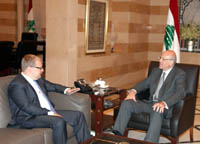 Estonian Foreign Minister Urmas Paet arrived at the Grand Serail in Lebanon to meet with PM Nagib Mikati and to escort to Estonia his seven countrymen released earlier in the day, LBC television reported on Thursday.
Estonian Foreign Minister Urmas Paet arrived at the Grand Serail in Lebanon to meet with PM Nagib Mikati and to escort to Estonia his seven countrymen released earlier in the day, LBC television reported on Thursday.
The kidnapped Estonians were freed in Lebanon after being abducted by armed men, as they entered the country on a bicycle tour from neighboring Syria.
Paet told LBC television on Thursday that France, Germany and Turkey helped to attain the release of the seven Estonians without the use of any force , adding that other parties also contributed to the Estonians’ release.
The seven Estonians are Kalev Kaosaar, August Tillo, Madis Paluoja, Priit Raistik, Jaan Jagomagi, Andre Pukk, and Martin Metspalu.
Political reason
An unnamed diplomat told Future News television on Thursday that the abduction of the seven Estonians happened for “political” reasons.
He also said that all data shows that the Estonians were outside Lebanon and were returned through an illegal border crossing, adding that the relevant Lebanese authorities were not present when the Estonians were handed over.
Sources following the case said investigators determined earlier that the video that was first sent by the kidnappers was uploaded in the Syrian capital Damascus, leading to speculation the men were moved across the border from Lebanon.
Hearing
Later on Thursday, Military Investigative Judge Fadi Sawwan heard the testimonies of the seven Estonians in his office at the Military Court in Beirut.
During the hearings which lasted around six hours, the seven revealed to Sawwan the identities, affiliation, beliefs and ideology of the kidnappers, National News Agency reported. However, the identity of the kidnappers will not be made public due to the confidentiality of the investigations, NNA added.
Ransom ?
The agency noted that the seven men were not threatened by their abductors ahead of their release and that they were not aware whether or not their country had paid a ransom in order to free them. “But they did not personally pay any ransom” to the kidnappers, NNA noted.
When asked whether the Estonian government paid a ransom, Paet referred only to the “costs” involved.
“There are always costs involved with such a joint (release) operation,” Paet told a news conference in Tallinn, Estonia without elaborating except he said “the cost was not minor.”
Lebanon’s Interior Minister Marwan Charbel, meanwhile, said he could not confirm reports a ransom was paid to secure their freedom.
“To my knowledge they (the abductors) did not make any demands for a ransom for their release,” Charbel told Lebanese television.
The abductors , believed to be a previously unknown group called Haraket al-Nahda Wal-Islah (Movement for Renewal and Reform), had reportedly demanded ransom in exchange for the release of the Estonians.
Arrests
Charbel revealed earlier that nine people, including Lebanese, were arrested in connection with the kidnapping.
Happy ending
Justice Minister Shakib Qortbawi, for his part, said he was pleased with the “happy ending” but underlined that the case was far from over.
“The case is not closed to Lebanon’s judiciary, which will continue its investigation until all details are uncovered and those responsible for the abduction identified,” Qortbawi said in a statement.
Since the kidnapping in the eastern Bekaa Valley, the case had been shrouded in mystery.

Leave a Reply
You must be logged in to post a comment.